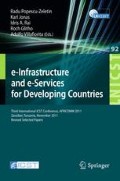Abstract
The concept of fair usage is a technique that has existed for years to achieve dynamic network resource allocation when the users do not consume their broadband access continuously all the time. Each user is expected to use his/her Internet access for only a short time or not at full speed all the time. Otherwise they may impair the quality of experience of other users. The purpose of fair usage and capping is to prevent a small range of users from consuming the entire bandwidth allocated by the network operator for all users. In this paper we propose a new fair usage model that aims at satisfying all the actors (OTT providers, network operators, clients on top of the pyramid, mass-market clients). This model is dedicated to developing countries. We implemented it on an open BSD router and measured impact of performances.
Access this chapter
Tax calculation will be finalised at checkout
Purchases are for personal use only
Preview
Unable to display preview. Download preview PDF.
References
Massoulie, L., Roberts, J.: Bandwidth sharing: objectives and algorithms. In: INFOCOM, vol. 3, pp. 1395–1403 (1999)
Guo, L., Matta, I.: Scheduling flows with unknown sizes: Approximate analysis. In: Proceedings of ACM SIGMETRICS (Extended Abstract), pp. 276–277 (2002), extended version available as a Boston University Technical Report BU-CS-2002-009
Bonald, T., Proutiere, A.: Insensitive bandwidth sharing in data networks. Queueing Systems 44(1), 69–100 (2003)
Yang, S.C., Veciana, G.D.: Enhancing both network and user performance for networks supporting best effort traffic. TON 12, 349–360 (2004)
Avrachenkov, K., Ayesta, U., Brown, P., Nyberg, E.: Differentiation between short and long TCP flows: Predictability of the response time. In: Proceedings of INFOCOM (2004)
Ruschitzka, M., Fabry, R.: A unified approach to scheduling. Commun. of the ACM 20(7), 469–477 (1977)
Coffman, E., Muntz, R., Trotter, H.: Waiting time distribution for processor-sharing systems. Journal of the ACM 17(1), 123–130 (1970)
Parekh, A.K., Gallager, R.G.: A generalized processor sharing approach to flow control in integrated services networks: The single-node case. IEEE/ACM Transactions on Networking 1(3), 344–357 (1993)
Fayolle, G., Mitrani, L.: Iasnogorodski. R.: Sharing a processor among many job classes. Journal of the ACM 27(3), 519–532 (1980)
Schrage, L.: The queue M/G/1 with feedback to lower priority queues. Management Science 13(7), 466–474 (1967)
Rai, L.A., Urvoy-Keller, G., Vernon, M.K., Biersack, E.W.: Performance analysis of LAS-based scheduling disciplines in a packet switched network. In: Proc. ACM SIGMETRICS 2004, pp. 106–117 (2004)
Silberschatz, A., Galvin, P.B., Gagne, G.: Applied Operating Systems Concepts. John Wiley & Sons (2000)
Kleinrock, L.: Queueing Systems, vol. I: Theory, vol. II: Computer Applications. John Wiley&Sons (1975/1976)
Aalto, S., Ayesta, U., Nyberg-Oksanen, E.: Two-level processor-sharing scheduling disciplines: Mean delay analysis. In: Proc. ACM SIGMETRICS 2004, pp. 97–105 (2004)
Brown, P.: Stability of Networks with Age-Based Scheduling. In: INFOCOM 2007, pp. 901–909 (2007)
Ayesta, U., Brown, P., Avratchenkov, K.: Differentiation between Short and Long TCP Flows: Predictability of the Response Time. In: INFOCOM 2004 (2004)
Altman, E., Barakat, C., Laborde, E., Brown, P., Collange, D.: Fairness Analysis of TCP/IP. In: Proceedings of IEEE Conference on Decision and Control, Sydney, Australia (December 2000)
Carofiglio, G., Muscariello, L.: On the impact of TCP and per-flow scheduling on internet performance. In: Proceeding of 29th Conference on Information Communications, INFOCOM 2010 (2010)
Yang, C.-W., Wierman, A., Shakkottai, S., Harchol-Balter, M.: Tail asymptotics for policies favoring short jobs in a many-flows regime. In: SIGMETRICS/Performance, pp. 97–108 (2006)
Author information
Authors and Affiliations
Editor information
Editors and Affiliations
Rights and permissions
Copyright information
© 2012 ICST Institute for Computer Science, Social Informatics and Telecommunications Engineering
About this paper
Cite this paper
Gourhant, Y., Gouta, A., Philip, V.D. (2012). Fair Usage and Capping for Providing Internet for All in Developing Countries. In: Popescu-Zeletin, R., Jonas, K., Rai, I.A., Glitho, R., Villafiorita, A. (eds) e-Infrastructure and e-Services for Developing Countries. AFRICOMM 2011. Lecture Notes of the Institute for Computer Sciences, Social Informatics and Telecommunications Engineering, vol 92. Springer, Berlin, Heidelberg. https://doi.org/10.1007/978-3-642-29093-0_4
Download citation
DOI: https://doi.org/10.1007/978-3-642-29093-0_4
Publisher Name: Springer, Berlin, Heidelberg
Print ISBN: 978-3-642-29092-3
Online ISBN: 978-3-642-29093-0
eBook Packages: Computer ScienceComputer Science (R0)

